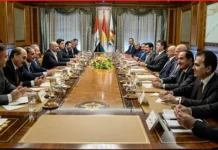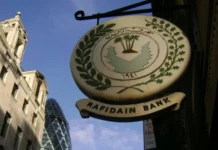Foreign Banks Are Violating The Law By Controlling Iraqi Banks.
October 23, 2025 Last updated: October 23, 2025 Al-Mustaqilla/- Economic sources revealed, in an investigation conducted by the Independent Press Agency, high foreign bank shareholdings in private Iraqi banks.
This raises questions about the extent to which these banks comply with Iraqi laws governing banking sector ownership.
Official data shows that some foreign banks hold stakes in Iraqi banks that exceed the legal limits, indicating potential violations. Prominent examples include:
• National Bank of Iraq: Jordan Capital Bank owns 62% of its shares, along with Cairo Amman Bank with 9.9%, and the Palestinian Arcadia Investment Fund with 5%.
• Al-Mansour Iraqi Bank: Qatar National Bank owns a 54% stake in the bank.
• Bank of Baghdad: The Kuwait Jordan Bank owns 52% of its shares.
• Arab Bank of Iraq: Arab Bank of Jordan controls 63.77% of the bank’s shares.
• Iraqi Credit Bank: The National Bank of Kuwait owns 92% of the bank’s shares, which raises significant controversy over foreign control of the banking sector.
• Iraqi Commercial Islamic Bank: Kuwait Finance House Bank S.A.E. owns 85% of the bank’s shares.
These high ratios indicate that foreign banks have almost complete control over a number of Iraqi banks, which contravenes Iraqi law, which restricts foreign bank ownership of local banks and limits their influence.
The Iraqi banking sector is considered a vital sector for the national economy, contributing significantly to project and investment financing and reflecting the stability of the financial market.
However, foreign banks’ holdings of ratios exceeding legal limits pose risks to economic sovereignty and threaten Iraqi banks’ ability to make independent decisions without external interference.
Economic observers stress the need to review banking laws and regulations and establish strict oversight mechanisms to ensure a balance between foreign investment and the preservation of national financial sovereignty, especially in light of the continued expansion of foreign banks in the Iraqi market. https://mustaqila.com/البنوك-الأجنبية-تتجاوز-القانون-في-الس/
Central Bank Governor From Duhok University: Financial Inclusion Is A Key Pillar Of Sustainable Development
October 23, 2025 His Excellency the Governor of the Central Bank of Iraq, Mr. Ali Mohsen Al-Alaq, emphasized that financial inclusion represents a fundamental pillar for achieving sustainable economic and social development. He pointed out that enabling citizens to access formal financial services contributes to promoting social justice and building trust with financial institutions.
This came during His Excellency’s speech at the Financial Inclusion Conference, organized by the University of Duhok, College of Administration and Economics, under the theme
“Towards a Sustainable and Promising Financial Environment Through Empowering and Adopting Modern Electronic Payment Technologies and Promoting Financial Inclusion.”
His Excellency explained that the Central Bank is working within the framework of the National Financial Inclusion Strategy 2025–2029 to expand the base of beneficiaries of financial services, empower women and youth, and promote the transition to electronic payments. He emphasized the
Central Bank‘s continued development of the digital payments infrastructure, support for financial innovation, and promote financial literacy in cooperation with universities and educational institutions.
The conference featured a large exhibition featuring numerous banking and non-banking financial institutions.
It also included an extensive discussion session on financial inclusion and its impact on monetary and fiscal policy, as well as the government’s role in raising financial inclusion indicators and enhancing economic stability. Central Bank of Iraq Media Office https://cbi.iq/news/view/3022
British Report: Modernizing Iraq’s Underdeveloped Banking System Is A Priority.
Energy and Business Iraq breaking banking system 2025-10-23 Shafaq News – Baghdad The British magazine “Global Finance” revealed on Thursday that economic diversification in Iraq is limited, considering that modernizing the “backward” banking system is a priority for the country.
In a report on the performance of central banks in the Middle East, seen by Shafaq News Agency, the magazine said,
“Iraq‘s GDP growth is expected to recover in 2025 after two consecutive years of recession, driven primarily by a recovery in oil production.]
” It noted that “the economy remains heavily dependent on hydrocarbons, which constitute 95% of government revenues making it vulnerable to fluctuations in global oil prices.”
She added, “Although economic diversification has long been on the agenda, real progress has been limited.
In response, the Central Bank of Iraq is promoting what it describes as‘developmental central banking,’focusing on directing credit toward strategic sectors, such as agriculture and industry, to expand the country’s economic base.” The report explained that “modernizing Iraq’s underdeveloped banking system is another priority.
Reforms are underway in state-owned banks, along with initiatives aimed at reducing the use of cash.”
In May 2024, new regulations were issued for digital banks and electronic payment companies, prompting several new players to enter the market.
According to the report, “Despite efforts to combat money laundering and terrorist financing, the Central Bank still faces severe compliance challenges, and many Iraqi banks remain restricted from dollar transactions due to concerns about illicit financial flows to sanctioned entities.”
The magazine noted in its report that “in early 2025, authorities uncovered a new scheme involving prepaid Visa and Mastercard products used to transfer funds to Iranian-backed militias.
In response, the Central Bank of Iraq set a monthly cross-border transfer cap of $300 million and capped individual cardholder transactions at $5,000.” https://shafaq.com/ar/اقتصـاد/تقرير-بريطاني-تحديث-النظام-المصرفي-المتخلف-بالعراق-يعد-ولوية
The Center For Banking Studies Organizes A Training Workshop On National And Sectoral Assessment Procedures.
October 23, 2025 The Center for Banking Studies at the Central Bank of Iraq organized a specialized training workshop on Thursday titled”National and Sectoral Assessment Procedures,” with theparticipation of a number of employees from banks and financial institutions.
The workshop aimed to enhance participants’ capabilities in understanding national risk assessment mechanisms and analyzing sectoral aspects related to banking operations, thus contributing to improving the performance of financial institutions in accordance with international standards for combating money laundering and terrorist financing.
This workshop is part of the Center for Banking Studies‘ annual training program, which seeks to develop the human resources working in the banking sector and enhance their readiness to keep pace with technological and regulatory developments in the financial sector.
The Center emphasized that organizing such workshops reflects theCentral Bank of Iraq‘s commitment to promoting a professional banking culture and consolidating institutional work practices based on efficiency and professionalism. https://cbi.iq/news/view/3023
For current and reliable Iraqi news please visit: https://www.bondladyscorner.com






